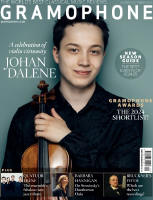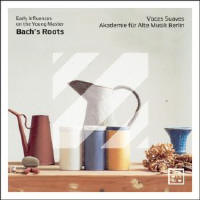Texte paru dans: / Appeared in:
|
|
|
|
|
|
Investigations on record of Bach’s immediate centralGerman precursors have often relied on content from composers actually related to him, especially those found in the so-called Altbachisches Archiv, a manuscript collection he himself owned. And yes, there is music from it here: one piece each by two of his father’s cousins, Johann Michael (a bright New Year celebration) and Johann Christoph (a beautiful four-part setting of Fürchte dich nicht whose febrile sense of tender, confidential yearning effortlessly reveals why Sebastian – who memorably set the same text – considered him the ‘profound’ one of the family). Mostly, however, the album samples other composers Bach would have come across in the early part of his career in Weimar, Arnstadt and Mühlhausen. The result is three premiere recordings, the most impressive being the psalmsetting for choir and five-part strings by Johann Samuel Drese, who as Kapellmeister at Weimar would have been young Bach’s boss: lively and direct, it steers a confident course through forceful, warlike musical imagery signifying God’s strength and more relaxed lyricism reflecting that ‘the God of Jacob is our refuge’. Georg Christoph Strattner was Drese’s deputy, and his piece is cast on a similar scale but with soloists too in a minidrama exploring the stock operatic simile of a storm-tossed ship seeking safety, in this case in Jesus’s salvation. It is perhaps the most modern-sounding piece, and while it could never be mistaken for Bach, the bustlingly jubilant mood of the orchestral opening has a prophetic ring. There is little of Bach to be heard, however, in the straightforwardly cheerful piece by Johann Georg Ahle, his predecessor as organist at Mühlhausen.
The works not new to the catalogue include a psalm-setting by an earlier Leipzig Thomaskantor, Johann Schelle, rich with imposing and expressive contrapuntal writing for five-part choir and strings, not unreminiscent of grands motets by Lully and Delalande; it seems unlikely that Bach would have been unresponsive to this kind of quality. Adam Drese’s Nun ist alles überwunden touchingly bids a gentle farewell to life, a philosophical vein often mined by Bach. (The booklet note, by the way, proposes that the piece is more likely to be by the other Drese, Adam’s cousin.)
The 12 voices of Voces Suaves are sonorous, clear and precise in ensemble. They are a little weaker as soloists, and there are places where their focus seems to wander and you feel a conductor might have brought out more effective results; the downward-plunging bass line in the final cadence of Michael Bach’s motet surely calls for more aplomb than it gets here. The strings of the Akademie für Alte Musik Berlin, stoutly reinforced in the bigger pieces by a bassoon, offer the kind of skilled support we expect, and have their own moments in two of Pachelbel’s delectable suites-cum-variation sets, prettily performed if again begging a firmer grip on forward momentum. But this is attractive stuff, and a satisfying release overall. |
|




